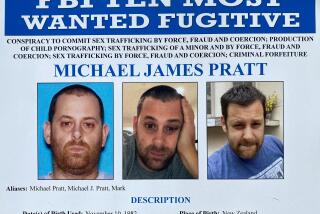Anti-Porn Forces Dismayed by Court’s Decision
- Share via
The U.S. Supreme Court’s decision to let stand a lower court ruling that a state anti-pandering law cannot be used to prosecute a producer of hard-core sex films is a setback in the fight against pornography in Los Angeles, authorities said Wednesday.
“We’re back to ground zero on pornography,” said Capt. Jim Docherty, commanding officer of the Los Angeles Police Department’s Vice Division. “We were hoping that this law would help in driving these folks out of Los Angeles and eventually out of the state.”
The Supreme Court’s decision Tuesday to dismiss the case against Harold Freeman of Encino put an end to a six-year court battle that had prompted concerns among producers in Los Angeles’ $550-million sex-film industry.
Freeman, 52, could not be reached for comment Wednesday.
He was arrested in October, 1983, and subsequently became the first person to be charged under provisions of the state’s “anti-pimp” law, which mandates a three-year prison sentence for hiring people to perform sex acts.
The 1982 law was introduced by state Senate President Pro Tem David A. Roberti (D-Los Angeles), whose district includes Hollywood, where there have been a large number of prostitution arrests.
No Obscenity Charge
Freeman’s attorney, Stuart Goldfarb of Beverly Hills, said Wednesday that he and his client had been confident that the Supreme Court would dismiss the case. Without an obscenity charge against him, Freeman was protected under the First Amendment, Goldfarb said.
“We’re thrilled, of course, that the case has finally been put to bed,” Goldfarb said. “But it was not unexpected. The pandering law was not intended to put people away for three years for making a film.”
Goldfarb said that his client is “still in the adult-film business” but that he does not produce films in Los Angeles. Goldfarb said Freeman also is involved in producing mainstream action and horror films in Hong Kong. Goldfarb did not elaborate on whether Freeman plans to make films again in this area.
Deputy Dist. Atty. Burton J. Schneirow, a prosecutor in the Freeman case, said he is disappointed but not surprised by the Supreme Court’s decision.
“When we originally did the prosecution, we knew we were in a sort of unchartered area,” Schneirow said. “We wanted to go after producers of these films rather than the product. We didn’t want to see Los Angeles become the porno capital of the world.
“We thought we had a pretty effective weapon” with the new law, Schneirow said. “The Supreme Court has given us guidelines now. We respect their decision, and we will follow it.”
At the time of Freeman’s arrest, prosecutors said that women he hired to perform in a 90-minute movie, “Caught From Behind, Part II,” were prostitutes because they were paid to perform sex acts. Freeman, who maintained that he had produced more than 100 full-length sex films, argued that the women were actresses.
Freeman was convicted in 1985 of five counts of pandering, sentenced to 90 days in jail and fined $10,000. But Van Nuys Superior Court Judge James A. Albracht postponed imposition of the sentence pending an appeal of the conviction.
The state Court of Appeal later upheld the conviction but agreed that Freeman should not be sent to prison. Both sides then appealed to the state Supreme Court, which unanimously reversed Freeman’s conviction.
The opinion by Justice Marcus M. Kaufman said that the Legislature did not intend that the anti-pandering law be used against the producers of sexually explicit films.
Kaufman’s decision was centered on the fact that the film Freeman made had not been found legally obscene, which would have placed it outside the protection of the First Amendment.
In Freeman’s case, money was paid to performers for acting, not for the purpose of “sexual arousal or gratification,” which is a necessary element to prove prostitution, the justices said.
The district attorney’s office then appealed to the U.S. Supreme Court.
Freeman was the only person arrested and convicted under the state’s anti-pandering law. Still, police said that Freeman’s case effectively reduced the number of pornographic films being made in Los Angeles. Although no statistics were available, Docherty said that during the time the case was being tried, many film makers left the area.
Goldfarb said, however, that the case against Freeman had no effect on Los Angeles’ sex-film industry.
Now, Docherty said, “they’re back in business.”
More to Read
Sign up for Essential California
The most important California stories and recommendations in your inbox every morning.
You may occasionally receive promotional content from the Los Angeles Times.













